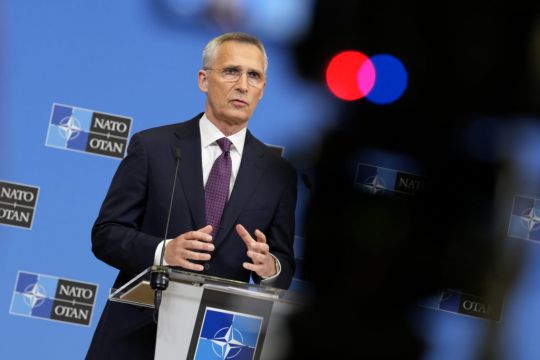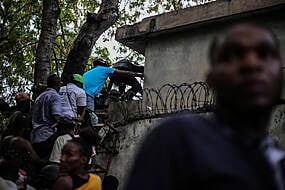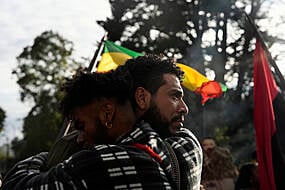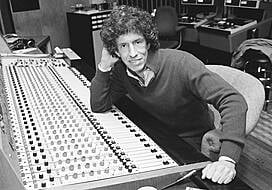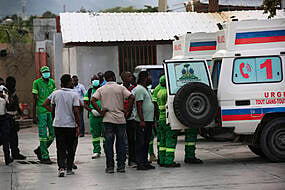Nato defence ministers gathered on Thursday to discuss future relations with Ukraine as Russia’s war on the country thwarts its hopes of joining the world’s biggest security alliance soon.
The ministers were also due to take part in a separate meeting at Nato headquarters of the US-led Ukraine Contact Group — the forum Ukraine’s supporters routinely join to try to drum up weapons and ammunition to help Kyiv fight the Russian invasion.
The Nato meeting comes just under a month before US President Joe Biden and his counterparts gather for a summit in Lithuania in a symbolic show of support for Ukraine.
They are expected to underscore their determination to act should Russian President Vladimir Putin try to expand the war westward.
Nato agreed in 2008 that Ukraine would join the organisation one day, but did not set a date for it to start membership talks.
As the war ground on, Ukraine applied for “accelerated accession” to Nato on September 30. With its Crimean Peninsula annexed, and Russian troops and pro-Moscow separatists holding parts of the south and east, it is not clear what Ukraine’s borders would look like.
Nato Secretary-General Jens Stoltenberg has said there is no consensus for the country to join while it is at war with Russia.
“We agree that the most urgent task now is to ensure that Ukraine prevails as a sovereign independent nation because unless Ukraine prevails and can continue as a democratic state in Europe, there is no membership issue to be discussed at all,” he said, ahead of the meeting.
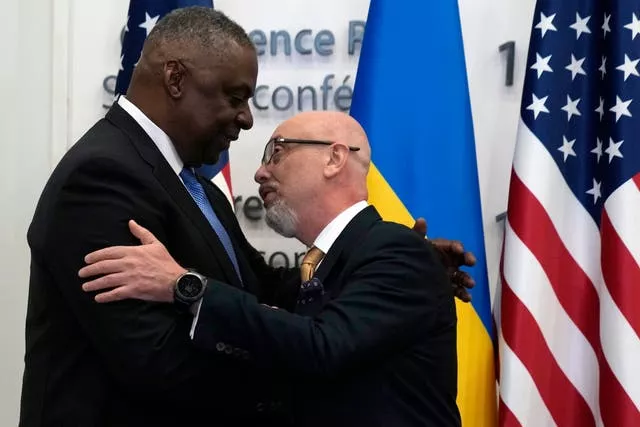
Mr Stoltenberg said that he expects the 31-nation alliance to “agree (to) a multi-year programme where we help to move Ukraine to transition from old standards, equipment, procedures, doctrines to Nato standards and become fully interoperable with Nato.”
Nato is also upgrading its relations with Ukraine. The Nato-Ukraine Commission, which will meet later Thursday, is set to be upgraded to a Nato-Ukraine Council, giving the country an equal seat at the table with the 31 allies.
Nato has no official presence in Ukraine and as an organisation provides only non-lethal support to Kyiv, although allies individually and in groups do supply weapons and ammunition.
Meanwhile, support is mounting for Mr Stoltenberg to have his mandate at the head of Nato extended yet again as Denmark’s prime minister ruled herself out of the running.
Mr Stoltenberg, a former Norwegian prime minister, has been Nato’s top civilian official since 2014. His term was due to expire last year but was extended to keep a steady hand at the helm after Russia’s full-scale invasion of Ukraine.
Mr Biden and his Nato counterparts are due to choose a successor at the summit in Lithuania in July. No candidate has been proposed publicly, and leaders usually decide by consensus on who should be appointed.

Nato is keen to name a woman to the top post, and Denmark’s prime minister, Mette Frederiksen, was thought to be a favourite after a meeting with Mr Biden earlier this month.
In a televised interview on Thursday, she said: “No, I am not on my way to Nato.”
But she did say that she would back Mr Stoltenberg if he was willing to extend his mandate.
Mr Stoltenberg himself has said he will not seek a fourth extension to his mandate. An economist by training, he was due to become the next governor of the Norwegian central bank when the simmering conflict in Ukraine escalated to full-scale war.
At Nato headquarters, German defence minister Boris Pistorius made clear that he would back an extension for Mr Stoltenberg if that became necessary.
“If we don’t agree on a candidate for successor, Nato won’t be able to go without a secretary-general, and of course I am for an extension – particularly as I appreciate our co-operation,” he told reporters.
